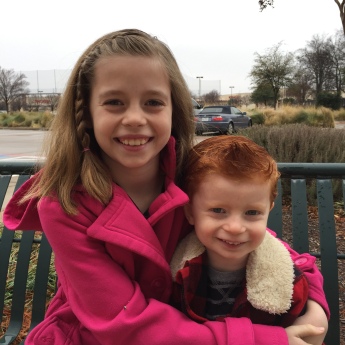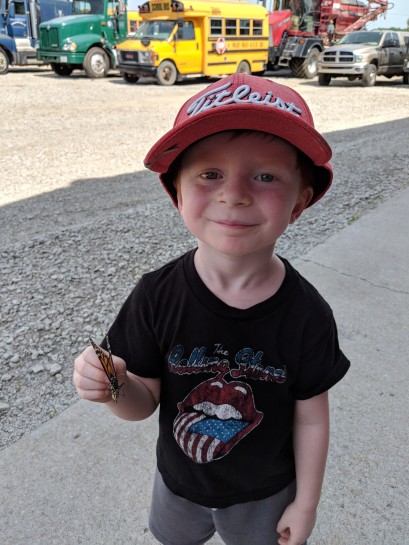Note: This post originally appeared on my first site. I’ve re-posted below. Apologies for such a long read… -TheERDad
Kids are mean.
It’s a sad reality in our world that growing up is really tough, and a lot of it has to do with how mean kids can be. Bullying, teasing, fierce competition at way too young an age, physical and emotional abuse – these things permeate the lives of our children every day. As parents, there is only so much we can do to protect them from the harsh realities of the world. We try to prepare them by giving them a quality education, teaching them manners, building up their self esteem in preparation for when some jerk kid will try to tear it down. We want to prep them for the “real world,” but sometimes we forget that the real world is exactly where they are already living each and every day. And we can’t plan for all contingencies. Kids are mean, and they are going to be mean to our kids one day.
In our society it is too often surprising and inspirational when someone treats another human being like just that – a human being.

I was watching the news a couple of nights ago, and saw a story about a young boy with autism in Florida who ate every lunch alone, presumably because the other children in the school wouldn’t sit with him. A Florida State Seminole football player was visiting the school and made the choice – impromptu, it seems – to sit with him. This made the news as a “feel good story” and the boy’s mother spoke out in the general and social media about what a wonderful thing this was. And I agree, it was fantastic. Kudos to a young man with, quite frankly, a lot going on in his life who took the time to just sit with a kid who had no friends and deserved one.
But here’s the problem I have with this story: It’s the fact that we’ve had to make it a story at all! In our society it is TOO OFTEN SURPRISING and INSPIRATIONAL when someone treats another human being like just that – a human being.
That kid deserves a friend. He deserves to have a child sit with him at lunch, someone to make jokes with, someone to talk with about the latest Marvel Superheroes movie, someone to complain to about the fact that his friggin’ mom packed him yet another friggin’ peach yogurt and she knows how much he friggin’ hates peach yogurt! Hell, he deserves to have someone sit silently next to him just because, in a show of solidarity. He deserves to have these things because he’s every bit as much a person as you or I. In fact, he probably deserves these things more than you or I.
Does anybody know if you can house train a pony???
I was putting my daughter to bed one night, and as we went through the bedtime routine, she proceeded to tell me all about her school day. The stories went on and on, one leading seamlessly into another. Just another attempt to delay the “lights out” call, as is her custom. This was a new school for her – my wife and I recently moved our family to a new (read: better) school district. She was telling me all about her friends, her teacher, about the games they played and the girl who sits next to her and how “she is so nice and her name is ______ and she has to be in a wheelchair because she got hurt when she was younger. . .”
Now, I’m not looking to violate anyone’s privacy, or make an example of any one in particular – certainly not an innocent little girl who just happens to go to school with my daughter. But this got my attention, and I wanted to see what my parenting for the last eight years had taught my daughter about how to interact with someone who has something different about them that is so clear and present on the surface, and so inconsequential deep down. Does she talk to the girl? Does she play with the girl? Has she made a point to sit with the girl, include her in group activities and see to it that that little girl doesn’t spend the third grade alone? Was she the champion for humanity that I’ve built her up to be in my head: striking blows to those who judge and lifting up any who are persecuted like a modern day super heroine? Does she ride in on her white horse to save the day and rid the world of evil?
After all, every super heroine needs a white horse. It’s mandatory super heroine issue.

What I really wanted to know was: did this little girl have to endure cruelty because of her physical appearance, and what was being done about it?
The answer relieved me, this time. As I asked (more subtly than above) about how the other kids interact with this girl, and how my daughter specifically does, it seemed to be no big deal. Turns out the school district we chose really is fantastic. There are aids, helpers, and necessary accommodations given to make things as seamless and productive and enjoyable as possible for all the kids who attend. It also appears that – so far as my (very observant) daughter has noticed – there have been no instances of discrimination, teasing, poor behavior or the like by the kids in the class. Things seem to be going well. It appears I need to make more friends with parents in the district, because they know how to raise their kids not to be little asses.
I like parents like that.
But we began to talk, and I explained to my daughter that there are going to be times in her life that she will see someone who is “different” from her or her friends being treated poorly just for this reason. A kid who is “weird” or “ugly” or “fat” or whatever is going to be treated badly in her presence, and we talked about what she thought of this and what she would do in such an instance. I told her about the boy with autism in Florida, and left out the part about the football player making a choice to sit with him, and asked for her impressions.
“I don’t think that’s right,” she told me. “I would tell my friends to stop it and I would be that kid’s friend. In fact, daddy, I’ve kind of decided that I don’t think I’m going to go the same way as the crowd most of the time . . . I think I’ll go my own way.”
. . .
I just finished buying my daughter a white pony online. Do you know how much a pony costs???? Does anybody know if you can house train a pony???? No matter: a super heroine needs a white horse, so a white horse she shall have.
. . .
In truth, my daughter has an incredible heart and is just a good person to begin with. I credit mostly her mother but partly myself for teaching her to value every person equally without judgement, and to stand up for what she believes in without fear or apology, and to think about what her parents and her faith and her God have taught her to do in this life, and to show respect.
But then again, she’s eight. Eight is pretty easy when compared to other ages. Long as you like dolls, toys, playing kitchen or ponies, you’re pretty much in good with most eight year old girls. But I know that being the champion for the people is going to get harder quickly. I pray she’s got the foresight and intestinal fortitude to do exactly what she says she’ll do and to tell “the crowd” to screw off, but I know how hard it can be when faced with that choice. It’s much easier to stay under the radar and just go with the flow. What will happen when taking a stand literally means losing her “friends” or her social status? I won’t be there to help her make that choice in real time, so I want to prep her as much as possible ahead of time.
Lessons given fade often, but examples set are lasting.
So what can we do as her parents? We can talk, lecture, teach and remind her until we’re blue in the face. We can punish her when she’s mean, reward her when she’s nice and treat her like Pavlov’s dog until we get the reaction we desire when she is delivered the same exact stimulus over and over. We can literally train her to act in a certain way and instill in her an understanding for the way others are to be treated. And we can, by doing this, raise a pretty decent kid.
But then she sees me screaming at the old man behind the wheel of the car ahead of me to get the hell out of my way.
She sees my wife purposefully avoid the register at Wal-Mart where the mentally handicapped person is trying to make a living bagging groceries – albeit very slowly.
She has to get up and move with me when I move away from the person sitting next to me in church who smells badly.
She hears the tv show I’m watching make fun of a fat person, a gay person, a religious person.
. . .
She hears (and recognizes) the racist or sexist or ethnically charged undertones in our “grown up” conversations in the kitchen, when the real ugliness creeps out.
And it does creep out at times, for all of us.
If you don’t think you have an ugly side, buy a new mirror.
. . .
Suddenly, all that teaching we’ve done is a waste. The lectures, the lessons, the pleas, the punishments and the rewards are all washed away with the same hypocrisy that ushers in a new reality for our children to see. They are left with uncertainty about what to do, void of that confidence to be the righteous person their mommy and daddy told them to be. Because if mommy and daddy aren’t even that righteous person then it must be because being that righteous person is scary or sucks!
Now, I’m not looking for or expecting perfection in parenting. Lord knows I fall short if that’s the standard. And I’m also not arguing that you have to turn off the show you’re watching in the background right now. You know, the one that toes the line between being hilarious and making you really uncomfortable when your mom is in town visiting and watches with you. Go ahead and listen to that song on the radio that you probably wouldn’t listen to if your pastor was in the car. Chuckle at the joke you heard at work today that you probably won’t repeat tonight at your dinner party. I understand that context is key. The way we act, interact and react is often dependent upon our company, our audience, our situation. You wouldn’t watch that movie with your kids but your wife and you really enjoy it. I get that. Politely steering clear of the guy at work who is so annoying you want to stab yourself in the eye when he starts talking to you isn’t the same as publicly and violently berating the barista at Starbucks who messed up your latte because his English isn’t so great. I understand that maturity and situational analysis, farse, humor, sarcasm and mastering the complexities of adult interaction all matter. Real life necessitate that we consider the environment before making a judgment or jumping to a conclusion that person A is a racist or person B is a judgemental ass. I understand that. And I understand that there is a difference sometimes between what you might say and who you might be.
But do our kids?
Because here’s the the thing: our children see us better than they hear us. Lessons given fade often, but examples set are lasting. Our children have to see us being the person we teach them to be so that they will have the courage to do the same when doing so is hard. And it often will be.
Ask yourself this question: if you could see yourself through the eyes of your child, would you like what you see? If the answer is no, then you have a lot of changes to make. I would imagine most of us do. What better motivation for change than the good of our children?
In the Emergency Department, I get to see a lot of bad choices. A good amount of what affects my patients is a result – direct or indirect – of the choices they’ve made for themselves. I often leverage my patients’ roles as parents to try to affect positive change for their health. Pleading with a grandmother to allow me to admit her to the hospital for her chest pain because I’m worried about her is often ineffective. Suggesting she stay the night so that her grandchildren won’t have to worry about her usually does the trick. Explaining to a mother that the internet article she read about vaccines and autism has been debunked over and over (and over) rarely carries weight (because what do I know, I’m just a doctor). But explaining to her that childhood meningitis is very real and very deadly often convinces a mother to do the right thing. Lecturing a forty year old man on the dangers to the heart that smoking creates is a useless endeavor. Looking daddy in the eyes and asking him if he’d like his eight year old son to smoke some day too usually receives a thoughtful pause. Change is hard. Failing your children should be harder.
(Side note: I’ll post on vaccines some other time. This post is long enough already…)

There’s no question that this is a constant struggle for all parents. If any of us believe we’ve got it figured out, that’s usually when one of our children humbles us – quickly and skillfully. Every day I struggle to be the person I teach them and expect them to be. I fail often. We all do. But it’s a strive for forward progress that makes us successful in the long run. It’s being mindful always of the little person whom you are literally molding into a big person. You will leave no bigger footprint on this world than your children, and you will affect no one more during your days on this earth than you affect them. We as parents have to make choices in our life that emulate the lessons we teach, so that our children will see the integrity behind our words and develop the confidence to adopt that same integrity.
Our children will become us, whether we like it or not. Certainly not in every way, but often in the ways that matter. We have to remember this as parents. We have to believe it. That belief can motivate us to change ourselves in order to influence our children. It will remind us to calm our tempers when faced with mounting frustrations. It will help us to be kind to those who may not seem to deserve our kindness. It will teach us daily to value what is most important in our lives, and teach our children that the value of their worth is not measured by physical appearance or ability, by skin color or ethnicity, in number of friends, party invites, dates, trophies, or social media likes. It’s measured by something much deeper, much more concrete. It’s measured by the level of effort we put toward being a better person each day, and by how we treat each other.
I know you want your children to live amazing, fulfilling lives rich with experiences, accomplishments and excitement. I do too. All parents do. Whether our child is the most popular kid in school… or the least. We as parents living in a community together have to make sure that every child has the opportunity to live out that goal, and that the people we are raising and placing into this world do the same. And it starts with us recognizing the value of one another, and choosing to celebrate and cherish that value publicly, for our children to see.
So let’s all try to do a little better as parents to be the change we want to see in our children – let alone the world. Let’s work to teach them, by example, how to practice acceptance of people’s differences and be a champion for what’s right. Let’s teach them to be a voice of the voiceless and a friend when a friend is needed. Let’s encourage them by living out the lessons we teach. We can do this! We should do this!
We can elevate our children toward greatness all the while cultivating their character. The two are not mutually exclusive. I’m just like most dads – I’d love to see my son one day out on the football field catching touchdown passes and being carried off the field by his teammates.
But i’d be just as proud to see him sit quietly at a lunch table with a little boy who just needed a friend.
What do you think? How has parenting changed you when it comes to acceptance and the way you interact with others in your world? What lessons can you live out better for your kids? Comment below!
Thanks For Reading
The ER Dad

